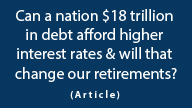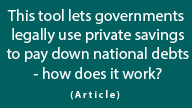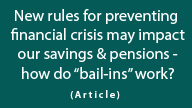Potential Euro Collapse & Rapid Redistribution Of Personal Wealth
By Daniel R. Amerman, CFA
Overview
There is a significant chance that the Euro itself will collapse in the coming weeks or months. Although a Greek government default may act as the trigger, the collapse of the European Monetary Union (EMU) and its currency is a quite different event from a single minor member defaulting on its debts. As discussed herein, the potential rapid annihilation of what used to be a global reserve currency could lead to one of the fastest and sharpest redistributions of wealth in financial history. If catastrophe takes down Europe's economy and banking system, then we may see repeated tidal waves of business collapse and spiking unemployment spreading out from the EU, and slamming into the already weak but tightly interlinked economies of the US, Japan, Canada, Australia and others.
At the same time there will be enormous windfall profits for some governments and for many millions of individual citizens. For many, whether they gain - or are destroyed - will be more or less happenstance. However, if we see the waves coming and are prepared, there are personal steps we can take to change whether we are likely to be one of the victims or one of the beneficiaries.
We'll get back to how that wealth redistribution could occur, and who would benefit and who would lose - but first and foremost, while there is a strong chance of currency disaster - it is not preordained. In an attempt to avoid global depression, the governments involved are working feverishly to keep the Euro from collapsing (keeping in mind the distinction between the entire European Monetary Union and Greece). When making your financial preparations, be sure to take into consideration this keen motivation, as well as that every aspect of the "rules" is determined by these governments. It is worth noting that changing every banking, accounting and money-related regulation or law before a collapse, is considerably easier than dealing with global depression post-collapse. Most of all, never forget that through the monetary creation ability of the collective central banks, there is an effectively infinite supply of money to work with.
When considering this extraordinary motivation and the full power of governments, there is a quite respectable chance that we are instead entering a period of rapid change in how the global order is structured, rather than total collapse. It isn't "game over" for the Euro - YET - as there are a powerful set of governmental tools available that can fight what looks to be inevitable under the current rules. It should also be noted that the preservation of the Euro is not necessarily the "good" outcome - far from it - as it could instead lock into place dysfunctional economies, hollow banking systems, long-term high rates of unemployment and the systemic Financial Repression of investors, all under the control of an increasingly powerful international State that grows ever less responsive to voters in individual nations.
However, the remaining lifespan of the Euro and the European experiment could nonetheless be measured in weeks by the time you read this. What history teaches us is that mistakes and accidents do happen. This is particularly likely to be true in times of enormous stress when crises are rippling back and forth around the world, and when the vast scale and complexity of the problems exceed the abilities of the leaders and their advisors. Greece could default any day, absent some swift and major changes - and Portugal, Ireland, Italy and Spain could be put fully into "play" with dizzying speed when Greece goes down.
There is a desperate need for a unified approach in defusing the crisis, but the election of Francois Hollande as President of France means that chances of a disagreement with Germany have risen sharply, which could be deadly for the Euro.
Perhaps the biggest variables of all are what choices will be made by China and a few other select powers. Financial writers are notoriously myopic when it comes to the geostrategic, and often forget that there is much more to power and history than income statements and the simple extrapolation of the current world order into the indefinite future. Yes, China could act as a savior of sorts for the West in order to keep its export markets going, or it could meekly accept being dealt a crippling economic blow if its markets for exports collapse.
Or China could with calculated self-interest seize the moment of its rivals' greatest collective vulnerability to make a decisive move for global ascendency, putting a deliberate knife into the back of the EU and the US economies. It is a moment of vulnerability that a resurgent and energy-rich Russia - or radical elements within Islam - might also try to seize in an attempt to change the global power structure. Weakening empires at vulnerable moments have historically attracted wolves, rather than helping hands from those peoples whom the empire has been attempting to hold down as second-class nations.
The future is in play as Greece teeters on the brink, and while it is highly desirable to "game" the scenarios in advance, be profoundly skeptical of anyone claiming knowledge with 100% certainty of what will be coming next. The governing concept is volatility, and the likelihood of a sharp change that may turn the familiar status quo upside down - whether currency meltdown, increasing control by the national governments and international organizations, or global power struggle - rather than the certainty of which particular sharp change it will be. The scenario we will explore in this article is of currency meltdown, and how personal wealth would be rapidly redistributed.
A Speculative Exploration Of Euro Meltdown
Germany is a nation that fears inflation for good historical reason, and among the nations of the world, Germany places a particularly high priority on price stability. Yet, so long as Germany remains in the European Economic and Monetary Union (EMU) with the euro as its currency, Germany may not be in control of its own inflation. In particular, the current crisis with Greece - and the crises that may follow with other nations such as Portugal, Italy, Spain and Ireland - may prove disastrous for German investors and taxpayers. For so long as it remains in the EMU, Germany may have no effective choice but to bail out countries that have been running up huge deficits – despite Germany itself not having the economic capacity to do this for all of Europe on an indefinite basis, let alone the political will to do so (as reinforced by recent German elections).
If the Euro collapses, it may create an enormous financial windfall for millions of individual Germans, as well as German companies, not to mention the German government. While leaving the monetary union is still far from certain, as Germany also has strong economic and political incentives to stay in the EMU, in this article we will say “what if” and explore some of the startling benefits for nations and individuals of quickly exiting a failing monetary union – as well as the many perils. But while the specifics of this article are primarily about Germany, the implications go far beyond Germans and Germany (although there are very important implications for arbitrage opportunities with German companies). That is, in this world of financial crisis and sovereign debt crisis, there are powerful related wealth and financial security implications for individuals in every country.
(Please remember that the European Economic and Monetary Union (the EMU) is not the same thing as the European Union (the EU), and Germany may potentially leave the monetary EMU without exiting the political EU.)
The German Government Windfall
First let's consider the current German government situation. Total outstanding government debt in Germany is equal to about 1.7 trillion euros, and as of 2009, equaled about 77% of the German GDP (according to the CIA World Factbook). Now let's assume that Germany does exit the economic and monetary union, and when it does so, it creates new Deutsche marks that are exchangeable one for one at the valuation for euros as of that exit date. After the exit of Germany, let's make the reasonable assumption that Germany's economy remains strong, at least relative to much of the rest of Europe. Let's also assume that with Germany exiting, and perhaps France exiting behind it, that the European Monetary Union is left with the weaker members, whose ability to repay their debts looks highly questionable to the world in general and investors in particular. So the euro plunges.
For our scenario, we’ll assume an immediate sharp drop of the euro in the neighborhood of 30-40% when Germany exits the EMU, relative to the new Deutsche mark. This value differential is assumed to rapidly increase as an inflation differential builds, and more strong nations leave the euro. After the passage of a period of time – and it could be weeks or it could be years – we'll assume the currency exchange rate is now 10 euros for every Deutsche mark. In other words, we'll assume that the euro loses 90% of its value relative to the Deutsche mark. (This assumption is not a precise projection, and there are cases for higher and lower projections, but it does have the virtues of being a round number and reasonable.)
With this scenario, Germany's euro-denominated national debt is now worth 10% of what it was when we look at things in Deutsche mark terms rather than the euro. Keep in mind also that the German government's income from taxes is in Deutsche marks, rather than euros. Germany is now repaying debt at 10 cents on the dollar (so to speak) and the value of its outstanding debt has fallen from 1.7 trillion euros down to 170 billion Deutsche marks – a 90% reduction in net debt. Thus, German national debt (ignoring any new debt issuance) as a percentage of the German economy has dropped from 77% of German GDP down to 7.7% of German GDP.
How much of that extraordinary benefit is realized in practice depends on what happens with German contract law internally. It is highly likely that if Germany leaves the European Economic and Monetary Union and replaces the euro with a new Deutsche mark, that there will be a wholesale statutory revision of internal German contracts, such that what was once payable in euros is now payable in the new Deutsche marks. If this happens, it will minimize many of the internal effects such as the value of German bonds held by a German bank, and this may keep the German banking systems’ government bond portfolio from being effectively wiped out. However, this probably won’t apply on an international basis, except in the unlikely event that Germany can get full reciprocity from other nations (with German investors who hold euro-denominated investments in other nations receiving payments in Deutsche marks instead of euros). Therefore, international transactions are where the major transfers of wealth are likely to occur, and Germany may reap a major windfall profit with foreign investors in government bonds, while not enjoying a windfall at all with domestic investors.
(The key principle discussed above is that repegging a currency under statutory law has quite different internal legal consequences than does ordinary inflation domestically destroying the purchasing power of a currency.)
The Economic Essence & A Race For The Exits
Germany repaying euro-denominated debts when it is no longer in the EMU illuminates two essential elements of sovereign debt. The first is whether the debt will be repaid, and the second is how much the repayments will be worth. International investors in German debt identified Germany as being a financially responsible nation that pays its bills, and they are quite likely to have every euro of debt repaid to them (particularly under the circumstances outlined in this article.)
However, Germany didn’t actually borrow in its own currency, but rather in the currency of a monetary union. Therefore, while it is an unintended consequence, the EMU monetary crisis creates a windfall profit opportunity in that if Germany exits the EMU, it has a one time opportunity to effectively repay its external debts in drachmas and liras rather than marks. This windfall opportunity will carry its own accelerant, because the exit of Germany would shift the burden to France. France would now face the choice between carrying much of Europe’s financial burden on its back – or making its own exit from the euro, and reaping its own windfall profit, much like Germany. This exit would of course accelerate the destruction of the euro, which would increase the size of Germany’s windfall.
There is indeed a chance that if France thinks Germany is about to exit, then French national interest may require it to exit first. Being the first to exit means reaping the maximum windfall profits from the destruction of the value of a nation’s national debt.
Now this is certainly not to say that there won't be any economic chaos and turmoil in Germany, or that the resulting potential shrinkage of the German economy may not more than offset this fantastic windfall, or perhaps much more than offset it (with the same holding true of France). All else being equal, the German and French governments would strongly prefer that there were no monetary crises with their monetary union partners. The one time debt windfall from the destruction of the value of the euro may not provide anywhere close to enough value to voluntarily “cheat” bond investors.
However, if Germany feels it is forced to exit the economic and monetary union, the debt windfall effect provides a powerful incentive to do it sooner rather than later. The lower the euro falls, the greater the damage to Germany, and the less the benefits of the windfall. If things are right on the edge – the greater the chance that France will strike first, and reap the disproportionate benefits of being the first strong power to leave. Taken in combination, this means that while Germany will likely continue to do everything it can to avoid having to drop the Euro, if and when it decides an exit is inevitable – Germany will have powerful financial incentives to move with breathtaking speed in destroying the euro. As will France.
Which leads us to the next essential point: that which applies to a nation also applies to individuals and companies. And this debt windfall – if it occurs – will likely leave some German companies and individuals much wealthier than they were before the crisis, even if Germany as a whole becomes somewhat poorer.
Two Individuals And The Redistribution Of Wealth
Let's consider two hypothetical German individuals, Dieter and Gretchen, and examine how the collapse of the euro relative to the new Deutsche mark affects each of their personal situations. We'll say that Dieter, the first individual, recently retired after having responsibly paid down all his personal debts, and that his life savings consists of having accumulated a bond portfolio with holdings in blue chip European companies as well as various government bonds, with a value of 500,000 euros. And we'll say that while his income is coming in the form of euros from outside of Germany, Dieter pays his bills in the new Deutsche marks within Germany. Furthermore, let's be charitable and say that despite the global financial crisis, none of the corporate and government bonds in Dieter’s portfolio actually default.
Once the euro has collapsed relative to the Deutsche mark, the income that Dieter has coming in falls by 90% in purchasing power terms. For instance, if he was earning an average of 5%, or 25,000 euros per year in interest, these payments would now have a purchasing power of 2,500 Deutsche marks. Simultaneously, the principal value of Dieter’s savings has fallen from the 500,000 euros down to 50,000 Deutsche marks.
After a lifetime of work, what was a very comfortable financial safety margin has now almost entirely disappeared. So that instead of ample bond interest payments to finance holidays abroad, Dieter finds himself relying on the public pension plan in an already stressed Germany with very little money available on interest income on his portfolio, and with the capital value of the portfolio itself only worth 10% of what it was terms of what he consumes in his native Germany.
Gretchen, our second individual, owns a small company that does business primarily in Germany, but has funding from a United Kingdom bank denominated in euro terms. With the Euro's collapse, Gretchen sees the income from her business transform into Deutsche marks even as her debts must still be repaid in euros. Euros which are now worth only one tenth of a Deutsche mark each. So if 70% of the value of Gretchen’s company was in fact borrowed funds, this 90% reduction in the value of the euro means that 90% of the value of her company's debt has been destroyed to the direct benefit of Gretchen. So her effective equity in the company has gone from 30% of assets to 93% of assets. As a direct result of what happened with Greece and then Germany, Gretchen experiences a fantastic increase in wealth from the very same factors that are devastating the value of Dieter’s life savings.
When we look at these two situations, what we can plainly see is that there is a massive redistribution of wealth that goes on when we have monetary crises. Millions of innocent people who've been playing by the rules and responsibly saving and investing are financially devastated. Other millions of people are enjoying lucrative profits and tax-advantaged surges in their personal net worth. With the distinguishing factors in this case being 1) whether they owe debt or own the debt of others; 2) the currency that is their source of income; and 3) the currency in which they pay their bills.
Winners & Losers
Across German society and across the entire German business landscape there will be many kinds of winners and many more kinds of losers.
Anyone who owns euro-denominated bonds loses, particularly if their expenses aren't paid in euros. On the other hand, anyone who owes large sums of money in euros, but has the ability to earn money in the new Deutsche marks, wins fantastically, as their debts are essentially paid off for them by the monetary crisis.
German financial institutions that pay their depositors in Deutsche marks, but have large portions of their investments in euro-denominated bonds and loans outside of Germany – where their investments will be repaid in euros – can expect to be devastated.
On the other hand, the German manufacturing firms who have borrowed extensively in euro terms internationally, but earn income in Deutsche marks (or that have the ability to have their international earnings float with exchange rates), will benefit in a major way as they make their own debt payments effectively in drachmas and liras. This may indeed drive the internal German political debate, as one has to look at the sections of German society that will benefit, and the sections of German society that will lose.
Individuals who own bonds and assets but don't have current income from the economy, such as retirees, may face devastation.
However, German manufacturing firms will gain a huge global advantage and the benefits will flow to the domestic German workforce, particularly those workers who are younger or in middle age, with many years remaining until retirement.
So as is always the case – and this is crucially important whenever we look at monetary crisis – we not only have an international redistribution of wealth, but a generational redistribution of wealth within each society. Germany will be no exception.
Currency Speculation & The Deadly Counterattacks
As crises continue to develop around the world, the headlines and the financial focus are likely to be on such subjects as currency speculation, as well as other derivatives strategies. However, the particulars of currency speculation may not work at all like some speculators think they will. As an example, some investors have quite accurately identified past moments of crisis for the US dollar, such as September of 2008 - only to be badly burned when the dollar's global refuge status turned out to trump fundamental deteriorations in the US economy.
Of greater concern is that the currency markets will be the subject of central banking, governmental and regulatory interventions, and given the stakes, these interventions will likely be on an unprecedented scale, both in terms of money deployed and rules changed. The central banks of the US, Europe and Japan have all been openly monetizing in recent years, so there are no handcuffs that prevent the banks from creating more trillions of dollars, euros or yen in an afternoon - with a timing that doesn't just defend the Euro, but is quite deliberately chosen to attempt to bankrupt the speculators.
The governments of Europe have identified their scapegoat, and it is the speculators. Rather than accept responsibility for the results of their own policies, the plan seems to be to try to punish the market forces that attempt to profit from deteriorating conditions. At the least, there are likely to be regulatory changes along the path ahead, implemented with a timing that is tightly coordinated with the central banks' interventions.
An obvious example is to flood the markets with trillions of dollars and yen in support of the Euro in the same hour that margin requirements are raised through the roof - and deliberately create a discontinuity, in which speculators suddenly find themselves in deeply underwater positions with no ability to unwind on the way down, it is difficult to find a buyer at all in the stampede for the exits, and they must come up with massive cash infusions to meet the margin calls that day - or go bankrupt in an afternoon. Then repeat, in a series of savage attacks on the speculators, who will be presented as traitorous near-criminals that are trying to bring down the West for personal gain. These tactics are child's play if one has unlimited monetary creation ability, absolute control of the rules and has historically unprecedented motivation - and all three elements will be there for desperate governments who find themselves backed in a corner and fighting for their lives.
The label could also be changed at will from "near-criminals" to just "criminals"; all it takes is a change in the governing law to make some kinds of speculative activity into actual criminal offenses.
This potential criminalization of certain types of financial speculation may sound far-fetched, but one has to remember the box the governments have created for themselves. The "too-big-to-fail" banks who are being propped up by the governments are some of the very same institutions who are speculating against the governments, and inflicting devastating financial losses on an institution that the government is trying to keep afloat can easily lead to into self-inflicted wounds on a massive scale. However, governments criminalizing the undesired activity could act as a sort of "banking neutron bomb" by threatening the personal destruction of the traders as individuals - both domestically and internationally - but while leaving the office around that individual intact, as well as their employer's balance sheet. European governments have already shown their willingness to start down this path, not only through proposed legal changes to date, but the identification of the speculators as effective enemies of the state. And the greater the future crisis - the more likely it is that substance will replace rhetoric.
On the surface, the potential collapse of the Euro arguably represents one of the most profitable arbitrages in the history of the currency markets - or it would be, in a theoretical free market with no government interventions. In practice, however, speculators face opposition from desperate governments who can and likely will be using a near infinite supply of money, along with implementing drastic regulatory rules changes, and changing civil and possibly criminal laws in a very deliberate and calculated effort to destroy them. It may take deft footwork indeed to reap the profits while dodging the savage counterattacks.
Multi-faceted Personal Strategies For Multiple Problems
Across the globe, for hundreds of millions of retirees and other long-term investors in the developed countries, while the specifics will vary by the country and currency – the inflation and debt-driven redistribution of wealth may end up being the number one determinant of financial security and ongoing standard of living.
This has been true in past crises. For instance, everyone talks about gold during the US monetary crisis in the late 1970s and early 1980s. Yet the redistribution of wealth that occurred in the United States via mortgages dwarfed the redistribution of wealth that occurred because of gold, both in domestic dollar terms and most particularly in the number of households affected.
What’s best for you? The correct answer of course is not just precious metals, nor debt-strategies, nor generational strategies, nor what you can do inside of a 401(k), but all of the above combined. As I have been exploring in my most recent work, it is in the integration of all these factors, with each component doing what it does best, that is the best way for individuals to not only preserve but increase their after-inflation and after-tax wealth during times of crisis.
The need for an integrated strategy with multiple components - potentially including a major precious metals exposure - is particularly important given the key themes within this article. We don't know whether it will be currency collapse as explored herein; or economic and/or military warfare as non-Western powers try to exploit a breakdown; or whether the forces seeking increased government controls over markets (and market participants) will win out instead. Regardless of the outcome, if the battle is fought, then the rules and regulations are likely to be changed along the path, and changed in a manner specifically designed to punish speculators of all kinds.
This is no mere theory when it comes to attacks on precious metals - one only has to remember the recent regulatory attack that used rapid fire margin requirement changes to drop the price of silver by 30% within days, in a manner designed to deliberately inflict maximum financial damage on those using silver futures to speculate against the currencies of their own governments. As the crisis grows, then the governments may very well deploy even more powerful weapons, perhaps in multiple coordinated attacks that deploy unlimited monetary resources, regulatory changes and legal changes potentially including tax law changes, as part of an overall strategy of Financial Repression. (If you are not familiar with Financial Repression and its current use by the US government, the link below contains vital information.)
http://danielamerman.com/articles/2011/RepressionA.htm
An uncertain future requires multiple approaches, integrated together, where the failure of one component as a result of government intervention does not destroy a person's life savings, but can potentially be offset by gains in other areas.
However, there is something that has to occur first before any of these components can be put into place. You need to thoroughly understand them. Education is the key. Understanding the different factors, understanding how they affect you, their interrelationships, understanding how to protect yourself and how to turn them to your advantage is the first and irreplaceable step in these times of turmoil and crisis.
(Most of the above article was originally written in 2010 and 2011, it has been updated as a result of developments in 2012.)
 What you have just read is an "eye-opener" about one aspect of the often hidden redistributions of wealth that go on all around us, every day.
What you have just read is an "eye-opener" about one aspect of the often hidden redistributions of wealth that go on all around us, every day.
 A personal retirement "eye-opener" linked here shows how the government's actions to reduce interest payments on the national debt can reduce retirement investment wealth accumulation by 95% over thirty years, and how the government is reducing standards of living for those already retired by almost 50%.
A personal retirement "eye-opener" linked here shows how the government's actions to reduce interest payments on the national debt can reduce retirement investment wealth accumulation by 95% over thirty years, and how the government is reducing standards of living for those already retired by almost 50%.
 An "eye-opener" tutorial of a quite different kind is linked here, and it shows how governments use inflation and the tax code to take wealth from unknowing precious metals investors, so that the higher inflation goes, and the higher precious metals prices climb - the more of the investor's net worth ends up with the government.
An "eye-opener" tutorial of a quite different kind is linked here, and it shows how governments use inflation and the tax code to take wealth from unknowing precious metals investors, so that the higher inflation goes, and the higher precious metals prices climb - the more of the investor's net worth ends up with the government.
 Another "eye-opener" tutorial is linked here, and it shows how governments can use the 1-2 combination of their control over both interest rates and inflation to take wealth from unsuspecting private savers in order to pay down massive public debts.
Another "eye-opener" tutorial is linked here, and it shows how governments can use the 1-2 combination of their control over both interest rates and inflation to take wealth from unsuspecting private savers in order to pay down massive public debts.







If you find these "eye-openers" to be interesting and useful, there is an entire free book of them available here, including many that are only in the book. The advantage to the book is that the tutorials can build on each other, so that in combination we can find ways of defending ourselves, and even learn how to position ourselves to benefit from the hidden redistributions of wealth.























